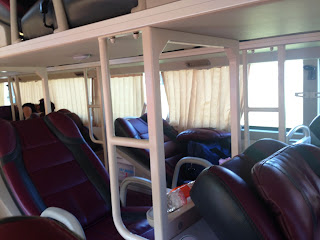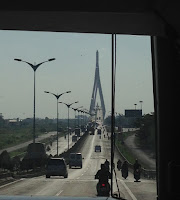For days now, I have had the same thought rolling around in
my head:
I either have an iron
stomach, the food I’m eating is not as risky as I thought…or I’m about to get
really, really sick.
 |
| Harvesting lettuce barefoot. |
It is customary in Vietnam to feed and water guests—no
matter what time they visit, if they are hungry, or if the family can afford to
part with the sustenance. Each farm I’ve visited has pulled out the stops to
welcome a foreigner—slicing up fresh fruits from their garden, cracking open
sodas and pouring them over ice they’ve just chopped up using a machete on the
sidewalk.
Travel nurses caution—only drink bottled water and avoid all
fresh things that can’t be peeled or soaked in a sanitizing solution first. But
turning down offerings from a family living on prayers for good weather, cool
temperatures and high yields—it just isn’t an option. It would be beyond rude.
Farmers in the Mekong Delta are extremely poor; that’s one
of the major inhibitors for adapting to climate change here. Farmers who are
worried about providing enough food, clothes and education for their families don’t
have the time or resources to dedicate to environmental issues—that’s what all
the researchers tell me. And if a researcher can’t guarantee that their new,
drought-resistant model will work, or that there will be a buyer for the
organic mangoes they’re trying to get farmers to grow, then farmers aren’t
going to try it. It’s too big a risk.
 |
| Seventy-year-old Tran Khan feeding his pigs. |
I met one 70-year-old farmer struggling to bring in roughly $62
USD a month selling fruit and pigs. That’s about $2 a day.
 |
| Christmas in Vietnam. |
The farmer, his wife, two daughters and grandchild live in
an extremely tidy, but small home outside of Can Tho City. They still had a
tiny Christmas tree propped up on a table outside when I arrived—one of the few
Catholic families in the area. I sat down in the open-air living room, pictures
of Mary and Jesus staring down at me from the walls and a slew of brightly
colored plastic toys at my feet for the 3-year-old. The farmer’s wife put a bowl
of at least six milk apples in front of me. They were already sliced open, the
mere act costing them the potential to make precious money for rice and other
staples. I ate the oozing fruit with prolonged hums of contentment.
 |
| A life built on vegetables and prayers. |
At another farm, several hours south of Can Tho, a woman
harvesting lettuce met us in her field; she refused to talk until she’d
showered. When she eventually emerged, hair dripping and earrings in, she cracked
open four bottles of soda and poured them over ice. Before I’d even taken the
glass of licorice-flavored fizz, the cubes were already melting. It was 90
degrees on the porch. The woman beamed at me as I took a big sip—front dentures
gleaming between much smaller, much less white surrounding teeth.
At first my strategy was to drink the soda as quickly as
possible, to minimize the amount of melted ice I’d consume. But as soon as I
drank, the woman refilled the glass. Each gulp was costing the family more
money. I watched the water level rise in my glass and forced myself to slowly
sip.
***
When I was 19, I became extremely ill while traveling in
India; the doctor said I’d picked up amoebas. His theory—eating watermelon or eating
off of a still-wet plate did me in. Whatever it was, living with that one-celled
organism was torture.
 |
| Sipping iced soda on the porch. |
I distinctly remember a day in August 2009, after I’d been back
in the states for several weeks. I was interning at an electric cooperative,
sitting at my desk entering data about solar farms. And I was still sick. Every
20 minutes, I would become temporarily paralyzed by intense stomach cramps. I
was light headed; walking and standing for more than five minutes was hard; I could
barely focus. On that day, I remember truly believing that I would never be
healthy again. During my lunch break, I called my mom and cried and cried, telling
her I couldn’t do it anymore. It was just too hard.
It took nine months for me to get completely back to normal.
***
With each sip of soda or iced coffee, with each bite of
fresh fruit, I remember India. I kept thinking, “This is it. This will be what finally
does me in. I’ll be sick by morning.”
But many mornings have come and gone. And I’m still waiting.
I know it can take up to two weeks for parasites to affect the
body. But I don’t know if I’ll actually get sick on this trip. I’m of course hoping for a miracle, rooting for a stomach left stronger after India. Whatever happens though, I will never take stomach comfort for granted again. Ever. I will always be grateful for my health.



















